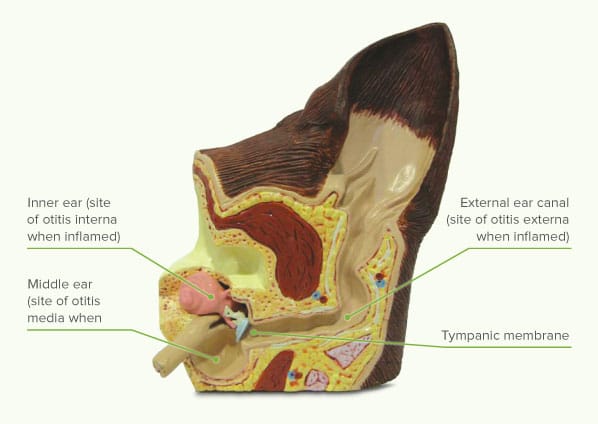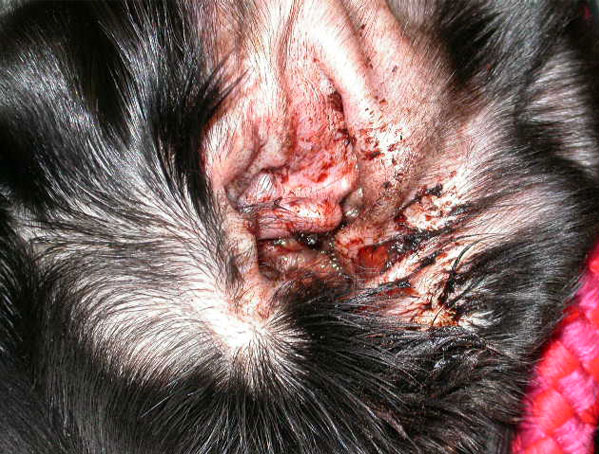Chronic Otitis in Dogs: Ear-Actually A Serious Problem!
Chronic otitis in dogs is a common and often underestimated problem that dog owners should not take lightly. It is a persistent inflammation of the ears that can lead to serious health problems if left untreated. In this article, we'll go into the details of this condition and show you how you can help your four-legged friend live a healthy, pain-free life.
Chronic otitis in dogs – what’s behind it?
The main causes of chronic otitis in dogs include:
- Allergies: Pollen, dust mites or foods can trigger allergic reactions that lead to ear problems.
- Infections: Bacterial or fungal infections are common triggers of otitis.
- Anatomical peculiarities: Dog breeds with long ears or narrow ear canals are particularly susceptible.
- Foreign bodies: Grasses, seeds or small insects can cause inflammation.
- Moisture: Water left in the ear can promote the growth of bacteria and fungi.

Symptoms:
Look for the following symptoms to recognize chronic otitis in dogs:
• Shaking head
• Scratching of ears
• Redness, swelling or unpleasant odor from the ear
• Pain sensitivity when touching ears
• Behavioral changes, such as restlessness or depression
• Balance problems

Diagnosis:
A veterinarian will carefully examine your dog's ears and may take a swab or sample of ear discharge to determine the exact cause of the inflammation.
Treatment:
Treatment for chronic otitis in dogs depends on the underlying cause. This includes:
• Medications: Antibiotics, antifungals, or anti-inflammatory medications
• Ear cleaning: Regular cleaning of the ears to remove dirt, wax and fluids
• Dietary changes: If you have allergies, a hypoallergenic diet may be recommended
• Surgical procedures: In severe cases, surgery may be necessary to repair the ear canal
Frequently asked questions (FAQs):
Can chronic otitis in dogs be cured?
Yes, chronic canine otitis can be treated, but a cure is not guaranteed. Treatment focuses on relieving symptoms and reducing inflammation.
How long does it take to treat chronic otitis in dogs?
The length of treatment for chronic otitis in dogs depends on the severity of the disease and the underlying cause. Some dogs require longer treatment than others.
Can untreated chronic otitis lead to complications in dogs?
Yes, untreated chronic otitis in dogs can lead to complications such as hearing loss, infections and inflammation. It's important to take your dog's symptoms seriously and take him to the vet if necessary.
Can I Help My Dog Avoid Chronic Otitis?
Yes, you can help reduce the likelihood of chronic otitis in dogs by regularly cleaning your dog's ears and providing him with a healthy diet. It is also important to avoid parasites such as fleas and ticks and minimize allergy-causing factors.
Summary:
Chronic otitis in dogs is a common condition caused by chronic inflammation of the ear. Symptoms can range from itching and pain to hearing loss and behavioral changes. A thorough examination and diagnosis by a veterinarian is important to determine the underlying cause of the condition and initiate appropriate treatment. Regular ear cleaning and a healthy diet can help reduce the risk of chronic otitis in dogs. If you suspect that your dog is suffering from an ear condition, you should take him to the vet as soon as possible to receive appropriate treatment.
Finally, it is important to emphasize that early diagnosis and treatment of chronic canine otitis is crucial to avoid complications and improve your dog's quality of life. By working closely with your veterinarian, you can ensure your dog receives the best possible treatment to maintain his health and well-being.
If you have a particularly stubborn case or don't know what to do, our specialist, veterinarian Anna Daum, happy to help you in our sister practice in Malsch.
